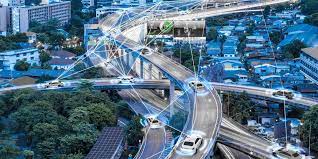ARTIFICIAL INTELIGENCE(AI)

Artificial intelligence (AI) has the potential to revolutionize various industries and sectors across the world, including Pakistan and foreign countries. Here are some key areas where AI's scope is expanding in the future:
.jpg)
1. Healthcare:
.jpg)
2. Education:
AI has the potential to enhance the learning experience by personalizing education based on individual student needs. Intelligent tutoring systems, adaptive learning platforms, and virtual reality applications can provide tailored learning experiences to students in Pakistan and foreign countries, ensuring better educational outcomes.
.jpg)
3. Agriculture:
AI can be utilized to optimize crop yields, predict weather patterns, and monitor soil conditions. Smart farming techniques, such as precision agriculture and automated monitoring systems, can help farmers make informed decisions and increase productivity while reducing resource wastage.
.jpg)
4. Transportation:
Autonomous vehicles powered by AI can revolutionize transportation systems, making them safer and more efficient. Self-driving cars and intelligent traffic management systems can help reduce accidents, congestion, and fuel consumption. This technology can benefit both Pakistan and foreign countries, transforming the way people commute and transport goods.
.jpg)
5. Finance:
AI can play a crucial role in the financial sector by automating tasks, detecting fraud, and providing personalized financial advice. Chatbots and virtual assistants can improve customer service, while machine learning algorithms can analyze large volumes of financial data for risk assessment and investment recommendations.
.jpg)
6. Smart Cities:
AI can contribute to the development of smart cities by integrating data from various sources to optimize resource allocation, energy usage, and infrastructure management. Intelligent systems can enhance public services, traffic management, and waste management, leading to more sustainable and livable cities.
.jpg)
7. Cybersecurity:
As technology advances, the importance of cybersecurity increases. AI can help identify and respond to cyber threats in real-time by analyzing patterns, detecting anomalies, and strengthening security systems. This is vital for protecting critical infrastructure, businesses, and individuals in Pakistan and foreign countries.
.jpg)
It's important to note that the scope of AI is not limited to these areas alone. AI's potential is vast and can be applied across many sectors to drive innovation and improve efficiency. However, the successful implementation of AI requires considerations around ethics, privacy, and equitable access to ensure that its benefits are realized by all segments of society.
AI In Future
.jpg)
AI in the future is likely to continue evolving and advancing in various fields, impacting society in profound ways. Here are some potential developments and trends that could shape the future of AI:
1. Enhanced Automation:
AI will further automate routine tasks across industries, improving efficiency and productivity. Advanced robotic systems and autonomous vehicles are expected to become more prevalent, revolutionizing transportation, logistics, and manufacturing.
2. Deep Learning and Neural Networks:
Deep learning algorithms, such as convolutional neural networks and recurrent neural networks, will continue to push the boundaries of AI capabilities. This could lead to significant advancements in areas like computer vision, natural language processing, and speech recognition.
3. Explainable AI:
As AI systems become more complex, there is a growing need to understand the reasoning behind their decisions. Explainable AI aims to make AI algorithms more transparent and interpretable, allowing users to comprehend how and why a particular decision was made.
4. Personalized AI Assistant
Virtual assistants like Siri, Alexa, and Google Assistant will become increasingly intelligent and personalized, adapting to individual users' preferences, habits, and needs. These assistants will be capable of performing more complex tasks and interacting with users in more natural and human-like ways.
5. AI in Healthcare:
AI will play a vital role in healthcare, assisting doctors in diagnosis, treatment planning, and drug discovery. AI algorithms will analyze large volumes of patient data, leading to improved disease detection, personalized medicine, and more efficient healthcare delivery.
6. Ethical Considerations:
The ethical implications of AI will become more prominent. Issues like bias, privacy concerns, and job displacement will require careful consideration and regulation. Developing robust frameworks for ethical AI development and deployment will be crucial.
7. AI and Education:
AI will transform education by providing personalized learning experiences, intelligent tutoring systems, and adaptive assessments. AI-powered tools will assist educators in developing customized teaching strategies and identifying areas where students need additional support.
8. AI and Cybersecurity:
AI will be both a boon and a challenge for cybersecurity. While AI can help identify and mitigate cyber threats, it can also be leveraged by hackers to launch more sophisticated attacks. The development of AI-powered cybersecurity tools will be vital to stay ahead of evolving threats.
9. AI and Climate Change:
AI can contribute to addressing climate change by optimizing energy usage, predicting weather patterns, and improving resource management. AI algorithms can help in designing more energy-efficient systems, analyzing environmental data, and driving sustainable practices.
10. Quantum AI:
The combination of AI and quantum computing holds great potential. Quantum AI algorithms could solve complex problems at a much faster rate than classical computers, opening up new possibilities in areas like drug discovery, optimization, and cryptography.
It's important to note that the future of AI is speculative, and while these trends are based on current developments and expectations, the actual trajectory of AI may differ in reality.
.jpg)

Best
ReplyDelete